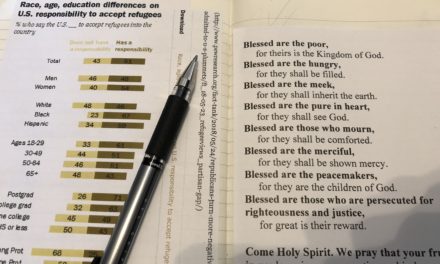“When I was conservative, they called me ‘Christian.’ But when I wanted to help the poor, they called me ‘Liberal.’ – Rev. Dr. John Perkins
Dr. Perkins then went on to say, “We got work to do. We gotta redefine what it means to be Christian in this country.” He said this at the 2012 Christian Community Development Association’s annual conference in Minneapolis (CCDA).
Apparently those sins “outside the skin” are considered Liberal – feed the hungry, rescue the starving, comfort and assist undocumented workers (illegal immigrants), stand up against payday loans… you get the idea. Those sins “inside the skin” are considered proper Christian sins: abortion, gay marriage, pornography… you get the idea.
Notice the “Liberal” sins are more economic and involve money to buy food or provide medical care. While “Christian” sins are more sexual – and require personal discipline to stop viewing pornography or voting for the marriage of gays. (Yes, I understand sexual immorality is political/social and therefore public. But both sides – “inside and outside the skin lists” are political, economic and social.)
Theological Comment
I believe this reveals one’s theological construct. If you believe Jesus inaugurated a new kingdom era with new creation bursting forth all around us, but yet not fully flowered until Jesus’ return, then you think of sins and what to do about them from a social or communal standpoint. If however, you believe in a personal and private (inside the sin only) salvation and atonement for solely private sins, then there isn’t much energy to be concerned about society’s woes. Instead the private salvation person will focus on saving souls (note that one’s soul is within one’s skin).
Many serious-minded Evangelical Christians who identify with the ‘saving souls’ side of this argument will quote Ephesians 2:8,9 as evidence of salvation’s personal singularity:
For it is by grace you have been saved, through faith—and this is not from yourselves, it is the gift of God— not by works, so that no one can boast.
If we continue on with the Apostle Paul’s thought we find this:
11 Therefore, remember that formerly you who are Gentiles by birth and called “uncircumcised” by those who call themselves “the circumcision” (which is done in the body by human hands)— 12 remember that at that time you were separate from Christ, excluded from citizenship in Israel and foreigners to the covenants of the promise, without hope and without God in the world. 13 But now in Christ Jesus you who once were far away have been brought near by the blood of Christ.
14 For he himself is our peace, who has made the two groups one and has destroyed the barrier, the dividing wall of hostility, 15 by setting aside in his flesh the law with its commands and regulations. His purpose was to create in himself one new humanity out of the two, thus making peace, 16 and in one body to reconcile both of them to God through the cross, by which he put to death their hostility. 17 He came and preached peace to you who were far away and peace to those who were near. 18 For through him we both have access to the Father by one Spirit. – Ephesians 2:11-18
And this:
3 Make every effort to keep the unity of the Spirit through the bond of peace. 4 There is one body and one Spirit, just as you were called to one hope when you were called; 5 one Lord, one faith, one baptism; 6 one God and Father of all, who is over all and through all and in all.
7 But to each one of us grace has been given as Christ apportioned it.- Ephesians 4:3-7
I believe Paul’s letter to the Ephesians is attempting to keep the racial reconciliation/redemption on track. ‘Gentiles and Jews are one new people’ he says. I find it especially telling that he places the “But” of 4:7 to say ‘yes, you are a Christian within your own private personal skin.’ Obviously salvation takes place within the individual. But Paul’s thought here come after his “oneness” teaching… ‘you are not Jew or Gentile – but one new people.’ Paul begins with the common reconciliation of peoples. Then as a necessary comment after the truth of the church’s oneness does Paul comment “But to each one of us grace has been given…”
“Make every effort…” What if the first church has only focused on personal private salvation instead of the communal aspect of the fellowship of the new Jesus followers? We would have the Corinthian church situation:
20 So then, when you come together, it is not the Lord’s Supper you eat, 21 for when you are eating, some of you go ahead with your own private suppers. As a result, one person remains hungry and another gets drunk. 22 Don’t you have homes to eat and drink in? Or do you despise the church of God by humiliating those who have nothing? What shall I say to you? Shall I praise you? Certainly not in this matter! – 1 Corinthians 11:20-22
What follows is Paul’s appeal to the words of Jesus about the one loaf and one cup, and “…whoever eats the bread or drinks the cup of the Lord in an unworthy manner will be guilty of sinning against the body and blood of the Lord. (verse 27) One person’s sin is not a private sin with private ramifications – it is a sin against the Church, against Jesus Christ. If you act ‘privately’ (above, verse 21) then you have sinned against the Body. It is an exegetical question but the sin of the Corinthians was more than likely a rich vs poor situation, or slave vs slave master situation. The poor/servants were not being treated well and fed like the wealthy/owner believers. The Corinthians were not acting out the new people of the kingdom like Paul thought it should be played out.
Indeed, Paul condemns the sexual sins of the Corinthians (cf. 1 Corinthians 5:1ff “It is actually reported that there is sexual immorality among you, and of a kind that even pagans do not tolerate: A man is sleeping with his father’s wife.”). Sexual sin is not “better nor worse” than economic sin. One cannot be accentuated more than the other and stay true to Scripture. And if did want to play this game of ‘which sin category does the Bible say the most about?’ then economic sin would wins hands down. The Bible says less about sexual immorality than injustice and economic immorality.
So what can we deduce? Sexual sin is immoral and not tolerable – sins inside the skin are “the old self” the old way of being human. The sins outside the skin are destructive of the Body of Jesus, the church. But we still tend to choose one sin category over the other.
Why do Liberals lean toward the social and economic sins, and Conservatives lean toward the private sexual sins? I answer with ‘because it depends on how you define “salvation”.’ Is salvation more private or more social? And just so I mention it, our leanings toward private sin and salvation reflects our American penchant for the rights of the individual and their ‘inalienable rights’ to freedom.
I am compelled by Dr. Perkins’ request – we must redefine what it means to be a Christian right now in our times. We need a broader understanding of our sin responsibilities and a broader understanding of salvation. We may not pick and choose which sins and politics we favor. That would be a highly selective understanding of the Gospel of Jesus Christ. Moreover, this choosing and picking sins against the Body of Jesus.
What is your opinion? And pay attention to you answer! For it will reveal much about how you understand salvation and the uncontrolled unbidden g-d who is…
…able to do immeasurably more than all we ask or imagine, according to his power that is at work within us, 21 to him be glory in the church and in Christ Jesus throughout all generations, for ever and ever! Amen. – Ephesians 3:20,21
(I used the New International translation)








